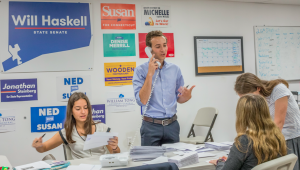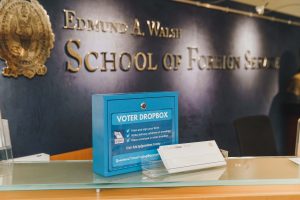This fall, many college students across the country may be looking to cast their first ballots in a major U.S. election. College students represent a unique voting group that often lives far away from the state they are registered to vote in. With expansions in voting-by-mail, that process has become easier. But during a midterm election full of contentious debates on abortion rights, gun control, and climate change, voting organizations are working harder than ever to make sure that each student has the resources they need to vote.
Absentee voting from college presents many barriers and complications for students. Matthew Reysa (SFS ’25), from Austin, Texas, expressed his frustration about the confusing Texas absentee ballot laws in an email to the Voice. “The deadlines are far before election day, the paperwork is confusing, and it almost feels as though they want to make it as hard as possible to vote,” he wrote.
Much of this confusing paperwork stems from policies instituted by the 15 states and two territories that require “acceptable excuses” to request an absentee ballot.
Alex Grass (COL’24), the head of operations at GU Votes, a student-led organization working to increase voter turnout at Georgetown, explained the two major excuses for college students, saying that some states excuse students who are living outside of the county because of college, while others have a general out of county option. He added that despite the confusion, all 50 states permit some form of absentee voting for being out-of-state during election day.
Issues with mail services both at Georgetown and in local elections offices can also present challenges. “Last year, I was unable to vote because my ballot got lost in the Georgetown mail center and I did not receive my ballot until after the election deadline,” Reysa wrote.
Brandon Wu (SFS ’24), who is also from Texas, noted a similar experience after attempting to vote in three elections on campus. “[For] the first general election in 2021 I did not get my ballot, a primary election I did, and then the following May election I didn’t. So I’ve got a 33 percent success rate in terms of getting my absentee ballot,” he said.
“[Texas] does not do online voter registration or online absentee requesting, so you have to send in your own application to your county, who will then send you your ballot,” Wu said. This added barrier, coupled with having to buy stamps from the Post Office and the unpredictability of the Georgetown mail service, makes it difficult even to get the voting process started.
“Especially if you live farther from the East Coast, you should have definitely requested your absentee ballot way in advance if you want to make sure that your vote gets in by November,” Wu said.
Even when students finally receive their ballots, new problems persist. The U.S. Vote Foundation website lists 14 states that require a witness or notary’s signature on an absentee ballot, another unexpected requirement that makes the process more confusing and can potentially demotivate students from voting.
A voting law signed by Texas governor Greg Abbott last September issued another host of new requirements for voting, including a requirement that voters provide a driver’s license number or last four digits of their Social Security number both to request and submit an absentee ballot. “Texas has passed a plethora of laws recently that changed the voting restrictions in the state, making it harder to vote,” Reysa wrote. “I wish it were easier to vote, especially because it is much easier for some of my friends from other states to register to vote.”
Certain states also require ballots to have the proper postage—two stamps—while others provide prepaid envelopes to send your ballot in.
GU Votes seeks to try to eliminate some of these barriers and make voting easier for Georgetown students. “We want on Georgetown’s campus 100 percent civic engagement, civic activity, so our goal is to make that a possibility,” Grass said.
The organization uses social media, campus-wide emails, and tabling efforts such as Storm the Dorms, a voter-registration effort in freshman dorms on National Voter Registration Day, to encourage students to vote and remind them of deadlines.
“The risk of you not even being able to vote at all increases exponentially once that [registration] deadline passes,” Grass said. “That’s why we do a lot of work on the front end.”
In addition, their website provides links to resources such as checking voter registration status, requesting absentee ballots, and tracking ballots.
GU Votes also provides office hours for students who would like an anonymous witness for their ballot by emailing voting@georgetown.edu to set up a time. They do not, however, have a notary, but Grass noted that the FedEx on M Street provides notary services
When students are ready to send their ballots back to their home state, they can use pre-stamped envelopes and ballot drop boxes provided by GU votes at the GU Politics Lounge, the Georgetown Scholars Program Lounge, Lauinger Library, the Black House, Hilltoss, Vital Vittles, and Uncommon Grounds.
For students who are registered to vote in D.C. elections using their Georgetown address, GU Votes organizes a walk from campus to Hardy Middle School to vote in-person on election day. “It is a great opportunity just to join a community of those who are civically active, civically engaged, where they can go vote, get an ‘I Voted’ sticker, but more importantly it’s just a way to build a community while you’re doing something civically meaningful,” Grass said.
However, will the efforts of organizations like GU Votes be enough? According to their Student Voting FAQ page, 93.1 percent of eligible Georgetown students were registered to vote in 2020, but the overall voting rate among eligible students was only 79.4 percent. Although these numbers were an 18.4 percent improvement from 2016, there remains a gap between those who are registered and those who actually cast their ballots.
Nationally, only 66 percent of college students and 54 percent of people ages 18-24 voted in 2020, meaning college-age students have significant strides to make to improve voter turnout
Wu has worked to register potential voters in his hometown of Spring, Texas, and recommends that people have more conversations about voting in order to boost overall turnout. He noted that GU Votes tabled in freshmen dorms recently and talked with several first-time voters.
“The best way you can convince someone that their vote matters is not by sending them an email, is not by putting a ballot application on their door, but actually having a conversation,” Wu said.
Grass highlighted the complications with absentee voting, and urged that students take initiative earlier. “We’re not sure how long it will take for ballots to be sent here, how long it will take for them to process and you to get them, it’s always the sooner the better.”






